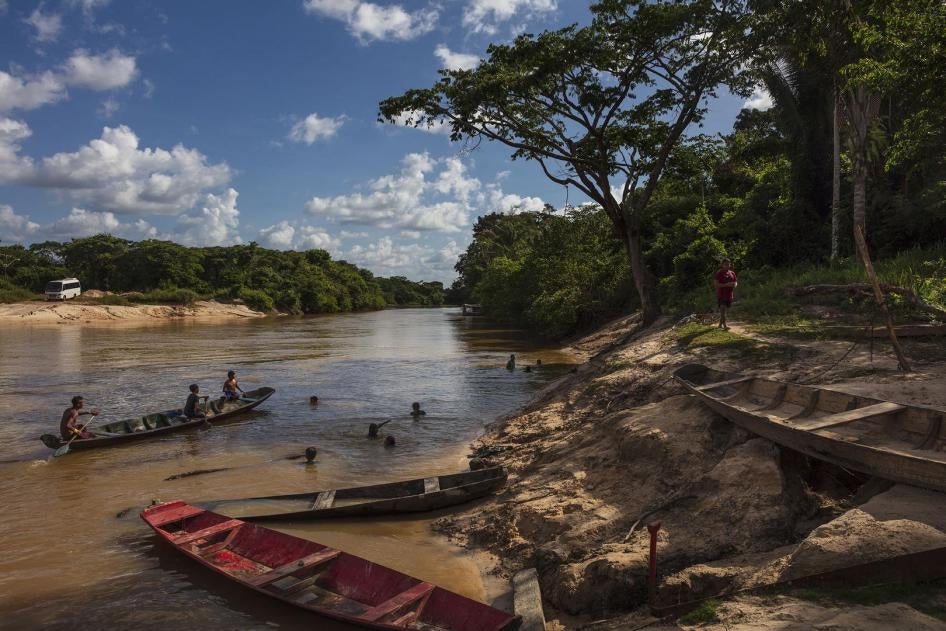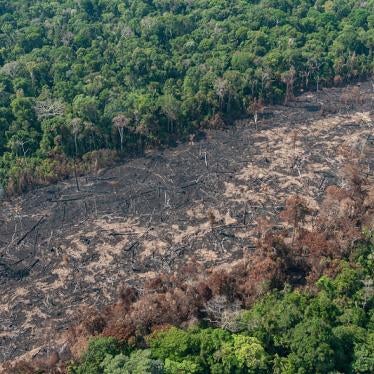Over the past year, France has been an outspoken voice on the mounting crisis in the Brazilian Amazon, calling international attention to the disastrous environmental policies of President Jair Bolsonaro. But if France genuinely hopes to help Brazilians save the world’s largest rainforest, there is more it can and should do.
Many Brazilians are intent on preserving the Amazon – within civil society, Indigenous communities, the private sector, and government agencies. Indeed, Brazil was once a global leader in conservation. But today its forest defenders are facing a president who opposes their efforts, and who is sabotaging the country’s ability to enforce its environmental laws.
It is very much in France’s—and everyone’s—interest to support those forest defenders. The Amazon plays a critical role in mitigating climate change by absorbing carbon dioxide from the atmosphere. It stores as much greenhouse gas as the entire world produces in 10 years. But accelerated deforestation is pushing it toward an irreversible tipping point after which vast portions could irreparably dry out, releasing billions of tons of stored carbon.
In 2019, Bolsonaro’s first year as president, deforestation increased by 85 percent from the previous year. A total of 9,000 square kilometers were cleared in the Amazon, an area more than 85 times the size of Paris. This year, nearly 8,000 square kilometers have already been deforested.
In August 2019, as raging forest fires exposed the extent of the crisis in the Amazon, President Emmanuel Macron spoke out, urging Bolsonaro to act. Bolsonaro angrily dismissed Macron’s exhortation as an affront to Brazilian sovereignty. France responded, wisely, by announcing a partnership to promote rainforest preservation with the governors of all nine states in the Brazilian Amazon, showing that its concern was widely shared within Brazil.
France’s boldest move came this past September, when it announced it wouldn’t support ratification of a pending trade agreement between the European Union and Mercosur, the South American trading bloc, without assurances that the parties are adhering to the goals of the Paris Agreement and that the deal won’t lead to increased deforestation.
The announcement echoed concerns raised by an increasing number of European officials that Brazil under Bolsonaro won’t comply with the agreement’s environmental provisions, which include commitments to fight illegal logging and uphold the Paris Agreement but don’t include sanctions for non-compliance. And it fed growing calls for negotiating additional language to bolster those provisions.
Several ideas have emerged since about the additional language, and they deserve serious discussion. But there’s a risk this discussion will distract from the urgent need to address the Amazon crisis now. After all, the deal is likely to take years to ratify and implement. In the meantime, Bolsonaro can continue dismantling Brazil’s capacity to comply with its environmental commitments and hasten the “tipping point” at which compliance effectively becomes impossible.
Instead of focusing only on what might happen to the Amazon after the deal is in place, the European Union should insist on seeing progress in curbing deforestation now, before ratification is even considered. And they should also seek to support the Brazilians who are trying to stop deforestation.
The deforestation is being driven largely by violent criminal networks that threaten, attack, and kill forest defenders who stand in their way. These mafias set fires to clear the land for cattle-grazing or for agriculture, poisoning the air that millions of people breathe and leading thousands to be hospitalized with respiratory diseases. And they are almost never held accountable for these crimes. So long as this impunity is the norm, the deforestation will most likely continue unchecked.
France is justified in its reluctance to ratify the trade agreement without further assurances that Brazil will comply with its environmental commitments. Yet, the most effective way to help at this critical juncture would be to establish concrete benchmarks for Brazil to meet before ratification can be considered.
One benchmark should be reducing deforestation rates enough to put the country back on track to meet its own target under the Paris Agreement of eliminating illegal deforestation by 2030. The second should entail substantial progress in ending impunity for violence against forest defenders, measured by the number of these cases investigated, prosecuted and brought to trial, and for ending environmental law violations, as measured by proportion of environmental penalties being enforced.
Ultimately, it will be Brazilians who save their rainforest. But they need the right conditions. Thanks to the EU-Mercosur deal, France and the European Union can give the Bolsonaro government a powerful incentive to provide these conditions. That needs to start now, not after the deal is eventually in place.










